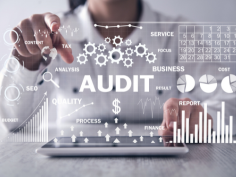The Certified Industry Accountant (CIA) Program in Auditing is a specialized certification aimed at equipping professionals with comprehensive knowledge and skills in auditing practices. This program is designed to provide a thorough understanding of auditing principles, techniques, and methodologies essential for ensuring financial transparency and compliance.
Scope
The scope of the CIA Program in Auditing includes:
- In-depth knowledge of auditing standards and procedures.
- Expertise in financial statement auditing and assurance services.
- Understanding of internal control systems and risk management.
- Skills in conducting audit engagements and evaluating audit findings.
- Application of ethical principles in auditing practice.
Career Path
Graduates of the CIA Program in Auditing can pursue various career paths in auditing and assurance services across different sectors. Potential career avenues include roles in public accounting firms, internal audit departments of corporations, government audit agencies, and consulting firms specializing in audit and assurance.
Job Titles and Positions
Upon completing the CIA Program in Auditing, professionals can qualify for job titles and positions such as:
- Audit Manager
- Internal Auditor
- External Auditor
- Compliance Auditor
- Risk Assurance Associate
- Forensic Auditor
- Assurance Services Consultant
- Government Auditor
- Senior Auditor
- Quality Assurance Manager
Program Highlights
- Comprehensive Auditing Knowledge: Gain a deep understanding of auditing standards, techniques, and procedures.
- Practical Skills: Develop hands-on skills in conducting audits, evaluating controls, and reporting findings.
- Ethical Practices: Learn to apply ethical principles in auditing and maintain integrity in financial reporting.
- Professional Development: Enhance your professional credentials and advance your career in auditing.
- Industry-Relevant Curriculum: Benefit from a curriculum designed to meet industry demands and stay current with auditing practices.
Who Can Enroll
The CIA Program in Auditing is ideal for:
- Accounting professionals looking to specialize in auditing.
- Recent graduates aiming to build a career in audit and assurance services.
- Professionals seeking to enhance their auditing skills and credentials.
Course Curriculum: Auditing
- Nature, Objective, and Scope of Audit: Direct tax audits aim to verify the accuracy of tax returns filed by taxpayers. The objective is to ensure compliance with tax laws and assess the correct tax liability. The scope includes examining income, deductions, exemptions, and other relevant financial data.
- Audit Strategy, Audit Planning, and Audit Program: Audit strategy involves outlining the overall approach to conducting the audit, considering factors like risk assessment and resource allocation. Audit planning involves detailed scheduling and coordination of audit activities. An audit program outlines specific procedures and tests to be performed during the audit.
- Risk Assessment and Internal Control: Risk assessment identifies potential areas of tax non-compliance or errors. Internal controls are policies and procedures that help ensure accurate financial reporting and compliance with tax laws. Auditors evaluate these controls to assess their effectiveness.
- Audit of Financial Items: This involves detailed examination of financial statements, accounting records, and supporting documents to verify income, expenses, and other financial items. Auditors check for accuracy, completeness, and adherence to tax regulations.
- Audit Report: The audit report summarizes the findings of the audit, including any discrepancies or issues identified. It provides recommendations for corrective actions and may include an opinion on the accuracy of the tax return.
- Internal Audit, Due Diligence, Investigation, and Forensic Audit: Internal audits are conducted by a company's internal audit team to assess internal controls and processes. Due diligence audits are performed during mergers, acquisitions, or investments to evaluate financial and tax risks. Investigations and forensic audits involve detailed examination to uncover fraud, misconduct, or irregularities.
- Professional Ethics: Auditors adhere to professional ethics to maintain integrity, objectivity, and independence in their work. Ethics guidelines govern auditor conduct, ensuring fairness, confidentiality, and compliance with legal and professional standards.
Exclusive Resources and Materials
- Interactive Lectures: Engage in dynamic video lectures covering key auditing topics.
- Case Studies: Analyze real-world audit scenarios to enhance problem-solving abilities.
- Assignments: Complete practical assignments to reinforce auditing concepts.
- Study Guides: Access comprehensive materials to support your learning journey.
- Q&A Sessions: Participate in interactive sessions to clarify doubts and deepen understanding.
Your Path to Auditing Excellence
The CIA Program in Auditing serves as your gateway to a successful career in auditing and assurance. It aims to equip you with the necessary skills and knowledge to excel in the field of audit practice and assurance services.
Join Us in This Auditing Journey
Thank you for considering the CIA Program in Auditing. We look forward to supporting you in achieving your career aspirations in the auditing field. See you in the program!






